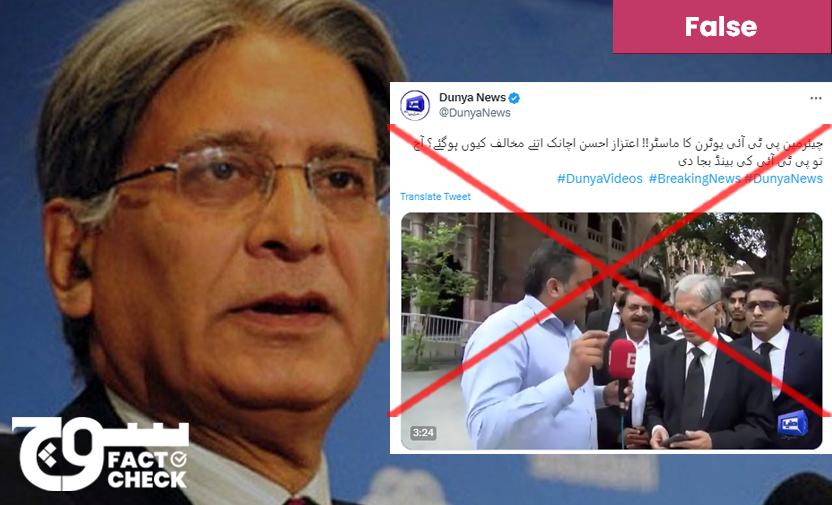
Claim: The Fifth Amendment of the US Constitution says the accused’s statement cannot be used against them in court, and they are allowed to change their statements.
Fact: The Fifth Amendment of the US Constitution does not say that the accused’s statement cannot be used against them in court, nor does it allow them to change their statements. It only protects them from being compelled to testify against themselves, and changing your statements can be a crime in some circumstances.
On 26 July 2023, Dunya News aired an interview with Aitzaz Ahsen, a senior lawyer and politician, on their TV channel and social media pages. The interviewer asked him about Imran Khan’s alleged change of stance over whether a paper he waved in front of a crowd at a rally was the controversial diplomatic cypher which he claimed proved US interference in Pakistan’s politics.
He responded by saying although Khan is famous for his U-turns, it is his right as an accused to change his stance, which is supported by jurisprudence. Ahsan goes on to claim the Fifth Amendment of the US Constitution says the accused’s statement cannot be used against them in court, and they are allowed to change their statements.
He says the phrase “taking the fifth” refers to the concept that “whatever the accused says cannot be used against them, the accused may take a U-turn or take the best stance depending on the advice of their lawyer.”
Fact or Fiction?
The Fifth Amendment of the US Constitution reads as follows: No person shall be held to answer for a capital, or otherwise infamous crime, unless on a presentment or indictment of a grand jury, except in cases arising in the land or naval forces, or in the militia, when in actual service in time of war or public danger; nor shall any person be subject for the same offence to be twice put in jeopardy of life or limb; nor shall be compelled in any criminal case to be a witness against himself, nor be deprived of life, liberty, or property, without due process of law; nor shall private property be taken for public use, without just compensation.
The relevant clause for this fact check is “nor shall be compelled in any criminal case to be a witness against himself”. This clause protects the accused from self-incrimination, meaning they cannot be forced to testify or provide evidence that would incriminate themselves. This is also known as “pleading the fifth” or “taking the fifth”.
The Fifth Amendment of the US Constitution protects the accused from self-incrimination, double jeopardy, and deprivation of due process but does not prevent their statements from being used against them in court or grant them the right to change their statements.
The prosecution can still use testimonies or statements made by the accused outside of court proceedings to prove their guilt. For example, suppose someone confesses to a crime during a police interrogation without being informed of their right to remain silent (also known as Miranda rights). In that case, that confession can still be used as evidence against them.
Changing one’s statement can also be a crime. If someone lies under oath in a court proceeding or to an agent of the law, they can be charged with perjury or obstructing justice, respectively.
Virality
On Twitter, the interview received more than 305,000 views, 463 retweets, and 1,900 likes as of 28 July 2023. Many users commented on Aitzaz Ahsan’s claims and criticised him for misrepresenting the Fifth Amendment of the US Constitution.
The interview was also posted by Dunya News to Facebook twice, with different captions, here and here. The first post got 81,000 views, 291 shares, 2,700 reactions, and 125 comments, while the repost from the same day got 93,000 views, 134 shares, 6,500 reactions, and 34 comments.
The interview was viewed on Facebook and Twitter more than 477,000 times in total and received more than 12,000 reactions in total.
Conclusion: Aitzaz Ahsan’s claims about the Fifth Amendment of the US Constitution are false and misleading. He misrepresents the scope and implications of the clause that protects the accused from self-incrimination and suggests that it gives them a carte blanche to change their statements.
To appeal our fact-check, please send an email to appeals@sochfactcheck.com
